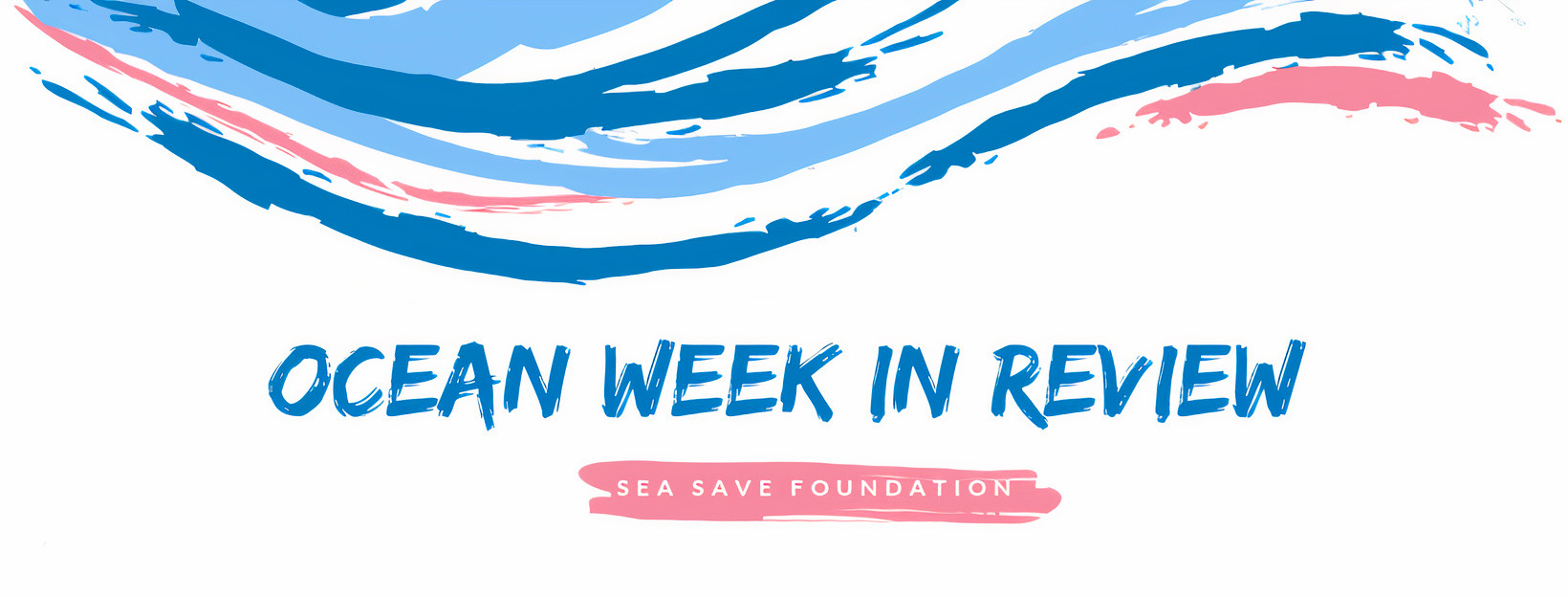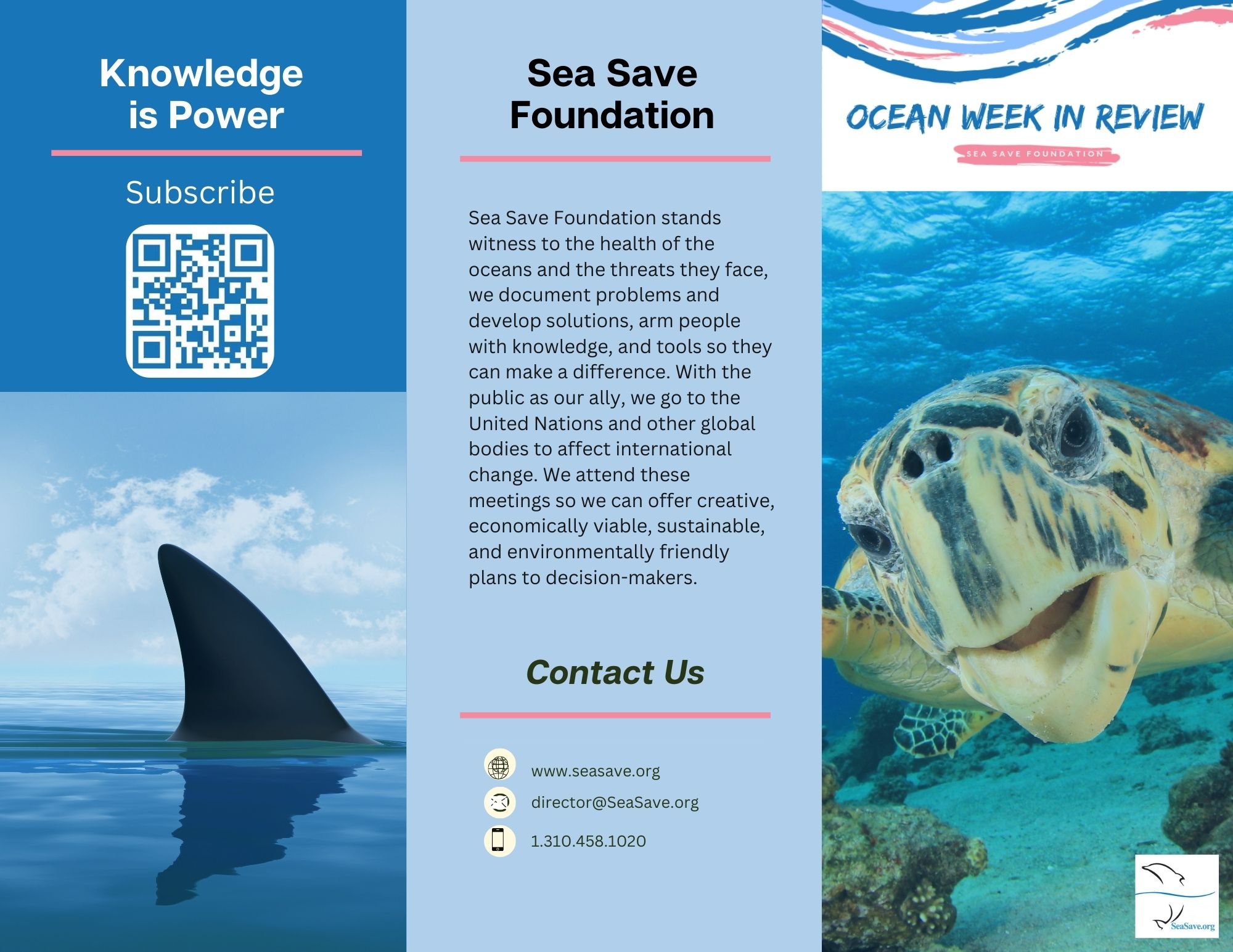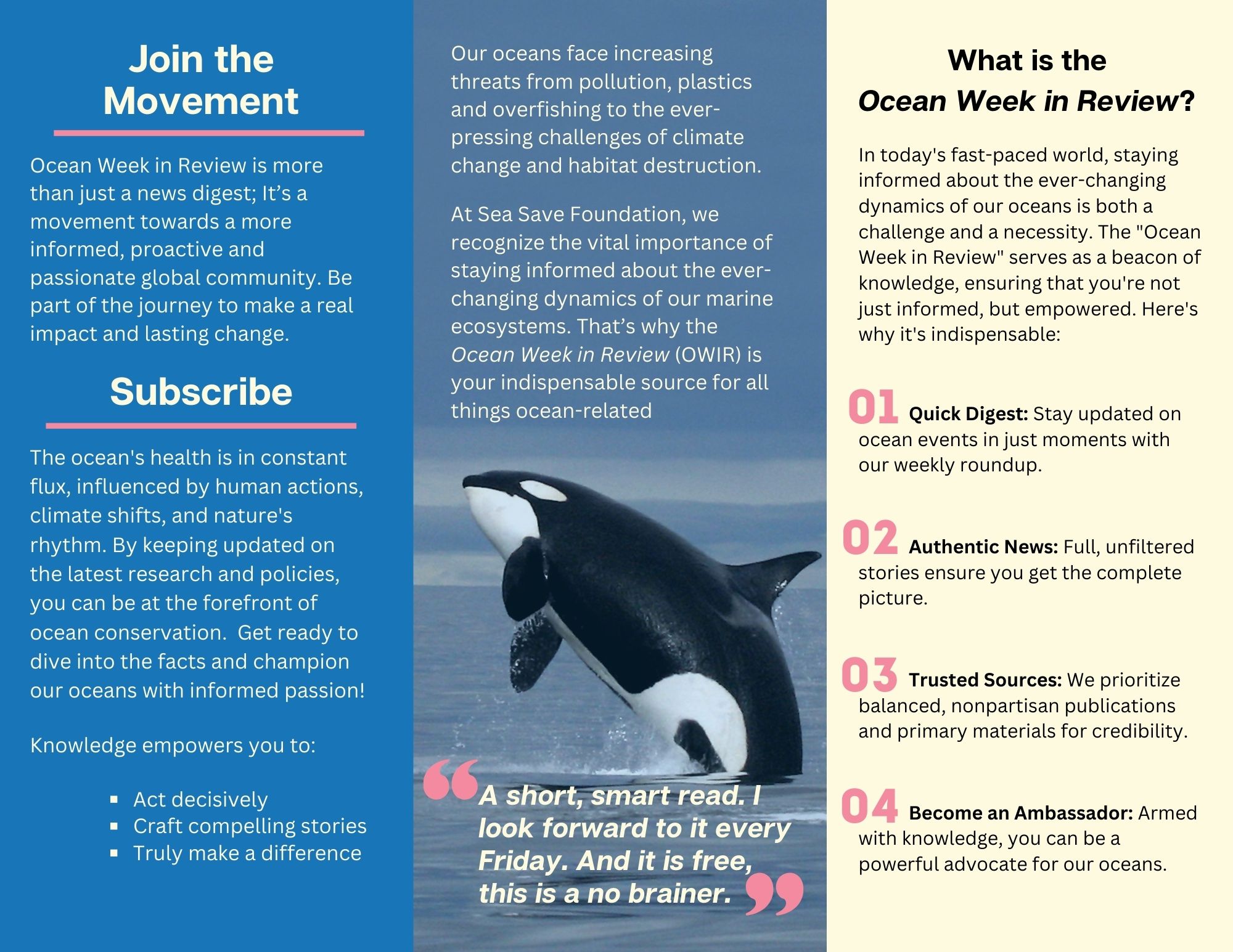“Ocean Week in Review” – Advancing Ocean and Climate Knowledge to Accelerate SDG Action
Sea Save Foundation
(
Non-governmental organization (NGO)
)
#OceanAction42004
Description
Ocean Week in Review (OWIR) is Sea Save Foundation’s free weekly newsletter and blog that translates critical scientific, economic, and international policy information about our oceans into accessible, actionable language. Designed for a global civil society audience, OWIR empowers individuals and institutions to engage meaningfully with SDG targets—especially those tied to ocean health, climate action, and land-sea connectivity.
Without widespread public understanding of ocean-climate-science interdependence, SDG implementation will falter. OWIR ensures this understanding exists—one story at a time.
- Monitor ocean-related policy, science, and economic developments weekly
- Identify and curate high-impact stories through reputable international sources
- Translate each into a 145-word, accessible summary with SDG contextual framing
- Distribute via email newsletter, blog, and social media
- Archive content for long-term access, impact tracking, and educational use
- Microdonations: The project is sustained in part by small contributions from engaged readers around the world, creating a grassroots funding base that supports editorial independence.
- Volunteer Playbook: A detailed operations playbook is being developed to train new volunteers, ensuring consistent editorial standards, topic selection, SDG alignment, and publication cadence. This will allow OWIR to scale and remain sustainable as new contributors join the team.
- Editorial Integrity: OWIR maintains strict standards to publish only nonpartisan, evidence-based content, prioritizing primary sources such as peer-reviewed science, official UN documents, and governmental publications.
- Free and Open Access: All content is distributed publicly, without cost or subscription barriers, through email and Sea Save’s online platforms, ensuring that decision-makers, educators, and citizens worldwide can benefit equally from access to science-informed reporting.
- Human Resources:
- 1 Research Director – oversees content selection, SDG alignment, and scientific accuracy
- 1 Summarizing Editor – crafts concise, engaging summaries from technical content
- 1 Webmaster – responsible for e-newsletter layout, delivery, and blog integration
- 1 SEO Professional – maximizes visibility and distribution through strategic tagging and optimization
- Budgetary Resources:
- USD 20,000 annually (allocated for webmaster, digital tools, distribution, and impact evaluation)
- Technical Platform:
- Email newsletter system: SalsaLabs
- Blog integration: SeaSave.org
- Social amplification: Cross-posting through Twitter/X, Facebook, LinkedIn, and Instagram
- Weekly editorial meetings guide topic selection and SDG linkage
- Collaboration with science institutions and multilateral bodies for content accuracy
- Partnerships with media outlets and NGOs to amplify reach
- Stories selected to align with global policy windows and treaty negotiations (e.g., CITES, UNOC, High Seas Treaty milestones)
- Governed by Sea Save Foundation’s executive leadership
- Managed by Director (Research) Summarizer, Webmaster for e-newsletter and blog creation, SEO Professional for maximum distribution
- Guided by a rotating advisory board of marine scientists, economists, and legal experts
- Editorial policy aligned with international ocean governance frameworks and UN SDG criteria
- Quantitative metrics: Newsletter open rates, social shares, reader growth, syndication
- Qualitative metrics: Stakeholder surveys, public commentary, citation in advocacy and policy reports
- Annual Evaluation Reports: Assess SDG alignment, audience reach, and contribution to policy literacy
- Alignment with SDG 14 targets: OWIR directly supports Targets 14.1 (reducing marine pollution), 14.2 (sustainable marine management), 14.3 (addressing acidification), 14.A (science and technology transfer), and 14.C (implementation of international law).
- Overlaps with other SDGs:
- SDG 13 (Climate Action): OWIR reinforces the ocean’s role in climate regulation, the blue carbon cycle, sea-level rise, and nature-based climate solutions.
- SDG 15 (Life on Land): Weekly coverage often explores land-sea interactions such as sediment runoff, mangrove deforestation, and biodiversity loss in coastal zones—illustrating that life on land and life in the sea are inseparably linked.
- SDG 17 (Partnerships for the Goals): OWIR fosters multi-stakeholder collaboration through knowledge-sharing, advocacy, and open-access science communication.
- SMART characteristics:
- Specific: 52 curated issues/year, each focused on top marine and policy headlines
- Measurable: Engagement analytics, syndication rates, and policy usage
- Achievable: Delivered by a trained internal editorial team with expert contributors
- Resource-based: Operates on an annual budget and robust editorial structure
- Time-bound: Ongoing from 2025 through 2028 with annual review checkpoints
SDGS & Targets
Goal 14
Conserve and sustainably use the oceans, seas and marine resources for sustainable development
14.1
By 2025, prevent and significantly reduce marine pollution of all kinds, in particular from land-based activities, including marine debris and nutrient pollution
14.1.1
(a) Index of coastal eutrophication; and (b) plastic debris density
14.2
By 2020, sustainably manage and protect marine and coastal ecosystems to avoid significant adverse impacts, including by strengthening their resilience, and take action for their restoration in order to achieve healthy and productive oceans
14.2.1
Number of countries using ecosystem-based approaches to managing marine areas
14.3
Minimize and address the impacts of ocean acidification, including through enhanced scientific cooperation at all levels
14.3.1
14.4
By 2020, effectively regulate harvesting and end overfishing, illegal, unreported and unregulated fishing and destructive fishing practices and implement science-based management plans, in order to restore fish stocks in the shortest time feasible, at least to levels that can produce maximum sustainable yield as determined by their biological characteristics
14.4.1
14.5
By 2020, conserve at least 10 per cent of coastal and marine areas, consistent with national and international law and based on the best available scientific information
14.5.1
14.6
By 2020, prohibit certain forms of fisheries subsidies which contribute to overcapacity and overfishing, eliminate subsidies that contribute to illegal, unreported and unregulated fishing and refrain from introducing new such subsidies, recognizing that appropriate and effective special and differential treatment for developing and least developed countries should be an integral part of the World Trade Organization fisheries subsidies negotiation
14.6.1
Degree of implementation of international instruments aiming to combat illegal, unreported and unregulated fishing
14.7
By 2030, increase the economic benefits to Small Island developing States and least developed countries from the sustainable use of marine resources, including through sustainable management of fisheries, aquaculture and tourism
14.7.1
Sustainable fisheries as a proportion of GDP in small island developing States, least developed countries and all countries
14.a
Increase scientific knowledge, develop research capacity and transfer marine technology, taking into account the Intergovernmental Oceanographic Commission Criteria and Guidelines on the Transfer of Marine Technology, in order to improve ocean health and to enhance the contribution of marine biodiversity to the development of developing countries, in particular small island developing States and least developed countries
14.a.1
14.b
Provide access for small-scale artisanal fishers to marine resources and markets
14.b.1
Degree of application of a legal/regulatory/policy/institutional framework which recognizes and protects access rights for small‐scale fisheries
14.c
Enhance the conservation and sustainable use of oceans and their resources by implementing international law as reflected in United Nations Convention on the Law of the Sea, which provides the legal framework for the conservation and sustainable use of oceans and their resources, as recalled in paragraph 158 of "The future we want"
14.c.1
Number of countries making progress in ratifying, accepting and implementing through legal, policy and institutional frameworks, ocean-related instruments that implement international law, as reflected in the United Nations Convention on the Law of the Sea, for the conservation and sustainable use of the oceans and their resources
SDG 14 targets covered
| Name | Description |
|---|---|
| 14.c | Enhance the conservation and sustainable use of oceans and their resources by implementing international law as reflected in United Nations Convention on the Law of the Sea, which provides the legal framework for the conservation and sustainable use of oceans and their resources, as recalled in paragraph 158 of "The future we want" |
Deliverables & Timeline
Knowledge Translation - Article about the UN lead effort to achieve SDG #14
Resources mobilized
Partnership Progress



Feedback
Action Network

Timeline
Entity
SDGs
Region
- Global
Geographical coverage
Other beneficiaries
- General public and civil society stakeholders worldwide
- Policymakers and UN delegates seeking to digest large amounts of material in a short amount of time.
- Media professionals covering environmental, climate, and ocean issues
- NGOs, educators, and students requiring current ocean and climate data
- Coastal communities affected by SDG policy outcomes
Ocean Basins
Communities of Ocean Action
Photos


More information
Countries
Contact Information
Georgienne Bradley, Director

